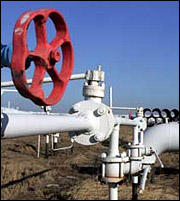When it comes to the production of natural gas, Israel calculates that it is ahead of Lebanon by three years. But perhaps the figure is closer to 20 if you factor in Lebanon's complacency and non-stop political infighting. While Lebanon is busy with endless debates, Israel is rushing to put the final touches on its bid to export gas to Europe.
Israel has rejected a proposal for a settlement made by the US administration to resolve the “dispute” between the Jewish state and Lebanon over the boundaries of each side’s exclusive economic zone (EEZ). The proposal concerned the disputed area of Block 9 in the Mediterranean, which Israel claims sovereignty over.
In other words, Israel is obstructing any progress on Block 9 – if it cannot exploit it itself, then it will not allow anyone else to do so.
While Globes did not provide details of the settlement, its report mentioned that the newspaper had contacted Israeli Ministry of Foreign Affairs officials for clarification, only to be told, “We do not comment on the matter due to its sensitivity.”
The newspaper mentioned that the disputed area, which covers 850 square kilometers north of Israel's Alon license, is likely to contain gas reserves similar in scale to Israel's Tamar gas field. Globes also stated that Lebanon, which refuses to demarcate its maritime boundaries in accordance with the Israeli interpretation, had signed an agreement with Cyprus in September 2010 that supports Israel’s interpretation, though it was not ratified by the Lebanese parliament.
Meanwhile, Israel continues its quest to tap into the European market, with the last of the obstacles to do so now cleared. According to recent Israeli media reports, Israel’s efforts in recent months focused on practical plans to transport gas to the European market, and are now way beyond the phase of exploration and drilling for gas. Israel is determined to make Europe a key player in Israel’s gas production, liquefaction, marketing, and transportation, specifically through the Cypriot gateway.
Consistent reports from both Cyprus and Israel indicate that Israel has made great strides in this vein, with special American backing. The practical interpretation of US-Cypriot agreements emerged on Wednesday, October 30.
According to Globes, Cyprus made a special request to turn the island into a transit station for Israeli gas bound for Europe, with confirmation that Israel accepted the request, and even initiated negotiations to find a mechanism for implementation. The two sides are expected to sign a special agreement in this regard in the next few months.
The newspaper revealed that the Cypriot request was related to Tel Aviv’s consent to allocating minimum volumes of gas produced from Israeli fields to be exported exclusively through Cyprus, after being liquefied in the facility it plans to build on the island, with an investment that may exceed $12 billion.
Globes reported that the Cypriot request was the culmination of three years of negotiations. “A strategic partnership with Israel is considered the best possible conduit to draw foreign investors to the island, and to deter Turkey from harming Cyprus’[s] interests,” stated the article.
Before Cyprus’s interests, the Cypriot liquefied natural gas (LNG) facility serves an Israeli interest, despite all claims to the contrary made by the Israeli media. The LNG facility achieves two strategic advantages for Israel: The facility spares Tel Aviv the need to build a costly underwater pipeline far from the coast, and the LNG facility would enlist two EU member states, Cyprus and Greece, as economic partners in marketing Israeli gas in Europe.
While Lebanon is asleep at the wheel, dreaming of its oil and gas without making any practical moves, Tel Aviv is motoring ahead.
To remind the Lebanese politicians obstructing the exploitation of Lebanon’s oil and gas wealth, we repeat what Al-Akhbar published three years ago, on September 25, 2010.
Israeli Minister Yossi Peled, appearing before the Knesset Economic Committee at a special hearing on the oil and gas sector, said that the Lebanese had large gas fields similar to the ones Israel had discovered. He cautioned that the Europeans, who were looking for alternatives to Russian gas, had initiated negotiations with Lebanon, saying, “Imagine what it would mean if this country became a gas producer,” something he claimed had equally alarming economic and security implications.
Although Israel managed to pinpoint the challenges it faced, it did predict at the time – and wager on – Lebanon’s complacency. In response to Peled’s warnings in the Knesset, Globes, in a front-page editorial on 5 October 2010, stated:
“Israeli sources who follow events in Lebanon are convinced that, at the current rate of progress, the Lebanese will award the first licenses this year [2010], and will start exploratory drilling within a year. The same sources believe that Lebanon will quickly be able to close the gap between it and Israel, and become a real competitor.“Past experience shows that Israel has no immediate reason for fear. Lebanon's natural resources will arouse internal (and external) conflicts no less severe than Israel's natural resources have provoked here ...“The oil giants will not rush to invest billions in a country where it is not clear who is in control, and where so many other countries openly interfere.”Israel has been proven right. Nothing in Lebanon is exempt from being the object of division and polarization, and thus, obstruction, including the oil and gas sector.
This article is an edited translation from the Arabic Edition.


